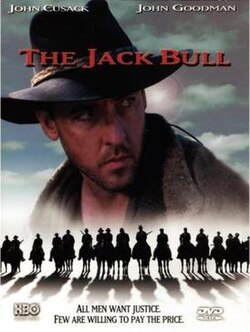Plot
In 1889 Wyoming Territory, Myrl Redding is a horse trader living with his wife Cora, son Cage, and some ranch hands. When Redding attempts to take his horses to a horse market in Casper, he discovers local wealthy landowner, Henry Ballard, has erected a tollbooth on the road to Casper, which goes through Ballard's property. Ballard, who disagrees with Redding regarding making Wyoming a state (which will restrict Ballard's commercial opportunities), charges Redding ten dollars to pass through his land. Unable to pay, Redding leaves two horses as collateral for payment along with a Native American ranch hand, Billy, to ensure the horses are not mistreated.
After selling the horses at Casper, Redding returns to Ballard's ranch to discover that the horses are malnourished and beaten, with Billy nowhere in sight. Redding vows that Ballard will pay to restore the horses' health, while Ballard refuses to pay anything. Redding approaches a local lawyer seeking to sue Ballard, however the lawyer is doubtful the local judge, Judge Wilkins, who is friends with Ballard, will do anything. Redding soon learns that Judge Wilkins has indeed thrown out the lawsuit, prompting his wife to attempt to meet the Attorney General, whose wife she is friends with, escorted by ranch hand Woody. During her visit, some of Ballard's men attack Woody and throw him in front of a horse carriage, which swerves to avoid him and ends up hitting and killing Cora. Redding, furious at the law's failure to do anything about the death of his wife and the loss of his horses, rallies a local militia of ranch owners and farmers and attacks Ballard's home, sending him fleeing.
Ballard manages to plead his case to the Governor of Wyoming, who dispatches a sheriff to arrest Redding. Redding manages to ambush the sheriff's men and in the confusion one of Ballard's men is killed. Seeking to ease the escalating violence, the Governor of Wyoming offers Redding amnesty if he surrenders. Redding accepts but later sends a letter promising to support Billy's tribe against the United States, jeopardizing his amnesty agreement. He is subsequently charged and convicted of murder. Ballard, meanwhile, is brought to Court and ordered to restore the horses' health by a sympathetic judge, Joe B. Tolliver, who also orders Ballard imprisoned for two years. Nonetheless, Judge Tolliver is forced to sentence Redding to be executed following his conviction.
After saying goodbye to his son, Redding is hanged and executed. Wyoming becomes a state, and Cage and Woody take the two healthy horses back to the Redding ranch.
This page is based on this
Wikipedia article Text is available under the
CC BY-SA 4.0 license; additional terms may apply.
Images, videos and audio are available under their respective licenses.
